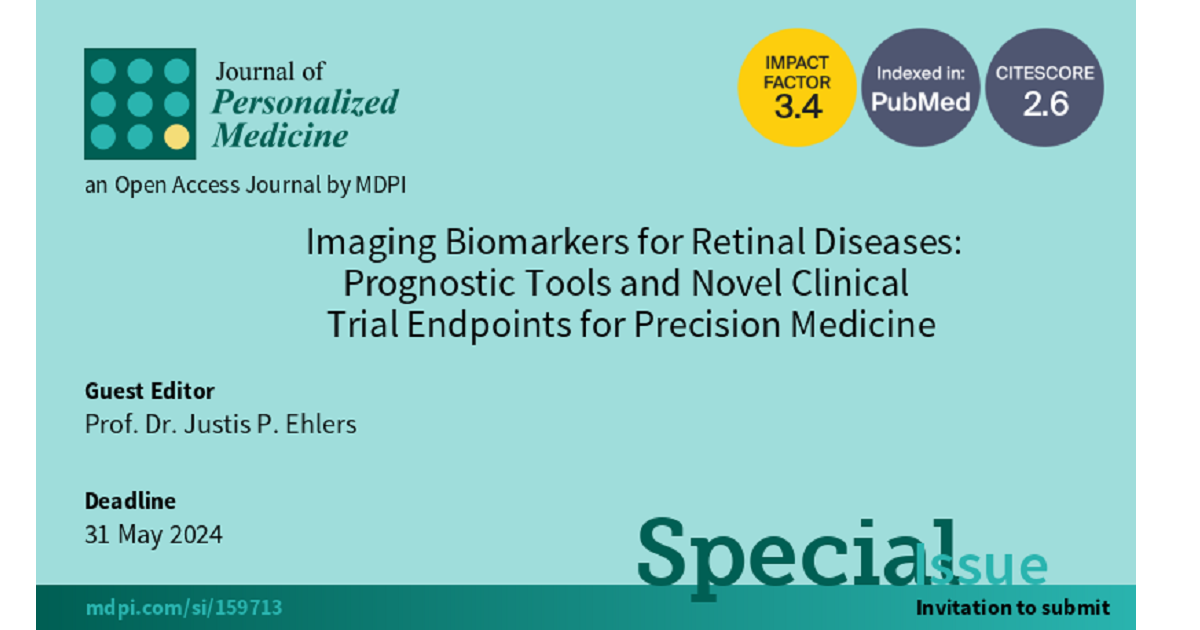Imaging Biomarkers for Retinal Diseases: Prognostic Tools and Novel Clinical Trial Endpoints for Precision Medicine
A special issue of Journal of Personalized Medicine (ISSN 2075-4426). This special issue belongs to the section "Disease Biomarker".
Deadline for manuscript submissions: closed (31 May 2024) | Viewed by 5483

Special Issue Editor
Interests: imaging biomarkers; deep learning; retinal diseases; advanced image analysis; intraaoperative OCT; precision medicine
Special Issue Information
Dear Colleagues,
Advancements in imaging technology have transformed the field of retinal diseases through new insights in disease pathogenesis and prognosis. Advancements in image feature extraction and analysis technology, such as machine learning, has enabled the next-generation identification and quantification of imaging biomarkers for macular diseases across multiple imaging modalities. These biomarkers present unique opportunities to enhance personalized medicine in retinal disease management through improved patient education, progression risk prognostication, clinical trial enrichment, and even new potential end points. As new therapies emerge, the enhanced phenotyping of these biomarkers may provide important information regarding precision medicine and decision-making for treatment. This Special Issue of the Journal for Personalized Medicine aims to highlight imaging biomarkers for retinal diseases across various modalities using advanced image analysis techniques. We look forward to receiving manuscripts related to new imaging biomarker discovery, image analysis techniques, and assessments of imaging biomarkers within clinical trial datasets.
Prof. Dr. Justis P. Ehlers
Guest Editor
Manuscript Submission Information
Manuscripts should be submitted online at www.mdpi.com by registering and logging in to this website. Once you are registered, click here to go to the submission form. Manuscripts can be submitted until the deadline. All submissions that pass pre-check are peer-reviewed. Accepted papers will be published continuously in the journal (as soon as accepted) and will be listed together on the special issue website. Research articles, review articles as well as short communications are invited. For planned papers, a title and short abstract (about 100 words) can be sent to the Editorial Office for announcement on this website.
Submitted manuscripts should not have been published previously, nor be under consideration for publication elsewhere (except conference proceedings papers). All manuscripts are thoroughly refereed through a single-blind peer-review process. A guide for authors and other relevant information for submission of manuscripts is available on the Instructions for Authors page. Journal of Personalized Medicine is an international peer-reviewed open access monthly journal published by MDPI.
Please visit the Instructions for Authors page before submitting a manuscript. The Article Processing Charge (APC) for publication in this open access journal is 2600 CHF (Swiss Francs). Submitted papers should be well formatted and use good English. Authors may use MDPI's English editing service prior to publication or during author revisions.
Keywords
- age-related macular degeneration
- diabetic eye disease
- optical coherence tomography (OCT)
- fluorescein angiography/ultra-widefield fluorescein angiography (UWFA)
- fundus autofluorescence OCT angiography
- retinal disease
- macular disease
Benefits of Publishing in a Special Issue
- Ease of navigation: Grouping papers by topic helps scholars navigate broad scope journals more efficiently.
- Greater discoverability: Special Issues support the reach and impact of scientific research. Articles in Special Issues are more discoverable and cited more frequently.
- Expansion of research network: Special Issues facilitate connections among authors, fostering scientific collaborations.
- External promotion: Articles in Special Issues are often promoted through the journal's social media, increasing their visibility.
- e-Book format: Special Issues with more than 10 articles can be published as dedicated e-books, ensuring wide and rapid dissemination.
Further information on MDPI's Special Issue polices can be found here.






